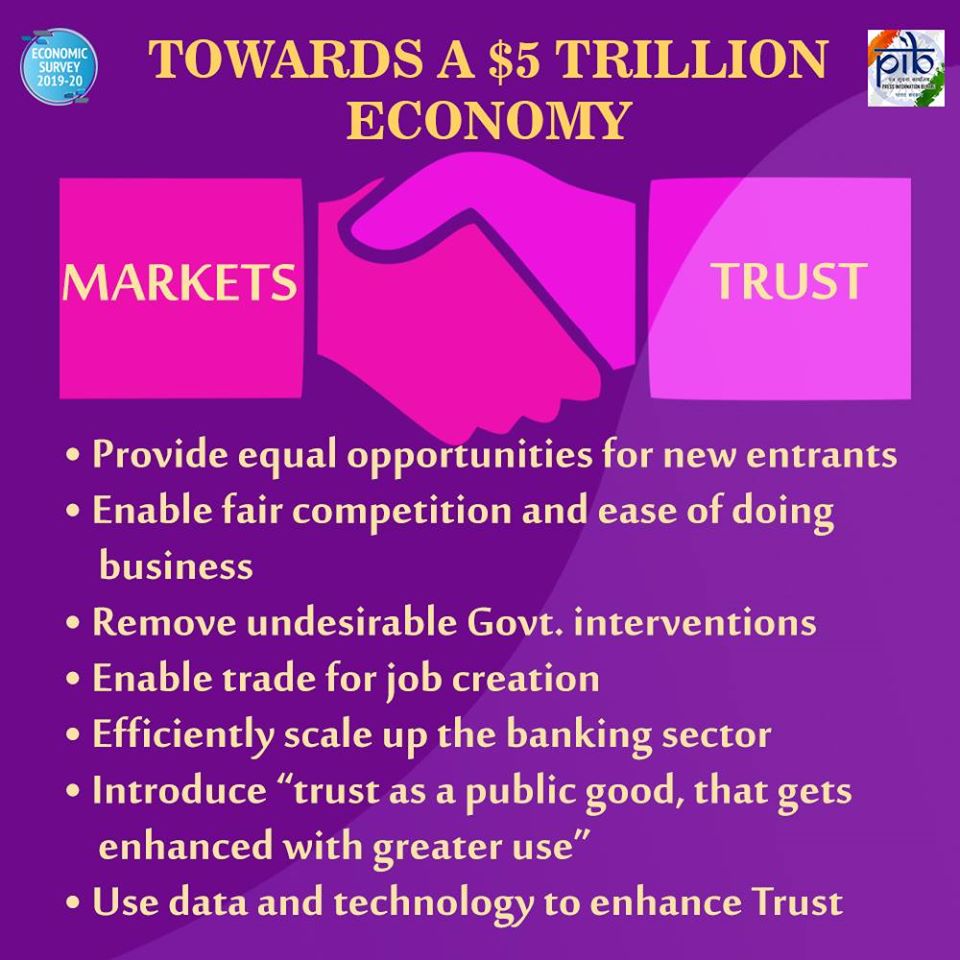Indian Economy
Economic Survey 2019-20: Highlights
- 01 Feb 2020
- 4 min read
Why in News
The Economic Survey 2019-20 has been tabled in the Parliament by the Union Minister for Finance.
- The theme of Economic Survey 2019-20 is "India’s aspiration of #Economy@5trillion with its theme of #WealthCreation".
Economic Survey
- The Economic Survey is a report that the government presents on the state of the economy in the past one year, the key challenges it anticipates, and their possible solutions.
- It is a crucial document as it provides a detailed, official version of the government’s take on the country’s economic condition.
- The document is prepared by the Economic Division of the Department of Economic Affairs (DEA) under the guidance of the Chief Economic Adviser (CEA), currently Dr Krishnamurthy Subramanian.
- It needs to be noted that the government is not constitutionally bound to present the Economic Survey or to follow the recommendations that are made in it.
Wealth Creation
- The Survey makes an attempt to craft a framework of policies that can foster wealth creation in India, which in turn, would set the economy firmly on an upward growth trajectory.
- The Survey identifies several levers for furthering Wealth Creation, which are:
- Grassroot Entrepreneurs: Entrepreneurship as a strategy to fuel productivity growth and wealth creation.
- Competitive Market: Promote 'pro-business' policies that unleash the power of competitive markets to generate wealth as against 'pro-crony' policies that may favour incumbent private interests.
- Remove anachronistic government interventions: Eliminate policies that undermine markets through government intervention, even where it is not necessary.
- Assemble in India: Integrate 'Assemble in India' into 'Make in India' to focus on labour intensive exports and thereby create jobs at a large scale. India should focus on other labour intensive sectors such as textile, clothing, footwear and toys.
- Banking: Efficiently scale up the banking sector to become proportionate to the Indian economy and track the health of the shadow banking sector (NBFCs).
- Privatization: Use privatization to foster efficiency and thus bolster the case for aggressive disinvestment of CPSEs.
Market Enables Wealth Creation
- The Survey lays stress on the importance of bringing an openness in the market that leads to wealth creation, in turn, boosting the economic activity through increased investment.
- India’s historical dominance on the global economy is the result of two factors: ‘Invisible Hand of Market’ and ‘Trust’. E.g. Indian economy returned to high growth trajectory post economic liberalisation.
- Trust is a public good that increases with use.
Thalinomics
- The Survey makes an attempt to relate economics to the common person using something that an individual encounters every day - a plate of food i.e a Thali.
- Affordability of Thalis vis-à-vis a day’s pay of a worker has improved over time, indicating improved welfare of the common person.






